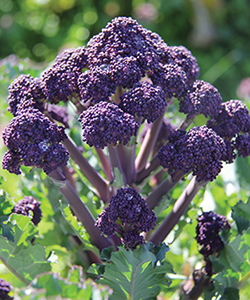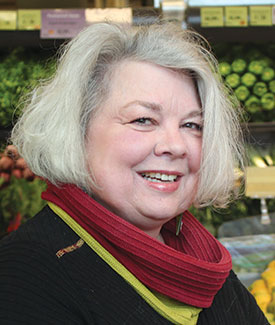Nutritionists' picks
This article was originally published in April 2017

In Season
- Organic and conventional local asparagus — from Inaba Farms, Andersen Organics and Schreiber & Sons
- Organic cantaloupe and honeydew melons — from Mexico
- New-crop organic Packham, Abate Fetal, Bosc and Asian pears — from Awesum Organics, Argentina
- Local, organic rhubarb — from Oregon growers
- Local, organic purple sprouting broccoli — from local Oregon and Washington growers

PCC Nutrition educator Marilyn Walls’ picks
Marilyn’s picks are so naturally colorful they can be used as egg dyes! In a large pot of water, bring turmeric, beets or blueberries to a boil with vinegar, then turn the heat down to a slow simmer. Carefully immerse raw eggs into the pot. The longer you leave them, the deeper the hues. After cooling the cooked, dyed eggs, coat them with olive oil for a final gloss.
Whole turmeric has been studied for its potent anti-inflammatory effects. The phytonutrient curcumin gives the rhizome that fluorescent yellow and orange color. Wash and chop unpeeled for tea or as an addition to your favorite dishes.
Beets contain a concentration of betalains that are the source of their deep red color and detoxification support. Delicious in salads and soups, beets also make a lovely pink-to-red egg coloring.
LaPierre Frozen Blueberries offer anthocyanins year-round for heart and memory support. Those anthocyanins continue to nourish the brain even if eaten frozen. Eggs dyed with blueberries become a stunning slate gray.

PCC Nutrition educator Nick Rose’s picks
Watermelon radish
Brighten up your crudité with this colorful cruciferous vegetable that looks just like a tiny watermelon when you slice it. Like other radishes, it has a spicy kick and a reputation for lowering the risk of certain cancers. Enjoy raw or cooked.
Choice Detox tea
Show your liver some love with this deliciously toasty herbal tea. Dandelion root, burdock root and rooibos combine for an earthy flavor that supports the body’s normal detoxification processes. Sales support the Bastyr University Student Scholarship Fund.
Britt’s Mix
You’ll find this probiotic-rich mixture of cauliflower, carrots, onions and a mélange of spices in PCC’s bulk fermentation stations. Frequent consumption of sauerkraut, kimchi and other fermented foods like this support our microbiome.
Iggy’s kombucha (on tap in the deli)
This local honey-brewed kombucha is available on tap in the PCC deli, where you’ll find seasonal flavors brewed with local honey, biodynamic green tea and ethically wild-crafted herbs. Kombucha also supports our microbiome with billions of probiotic bacteria.
